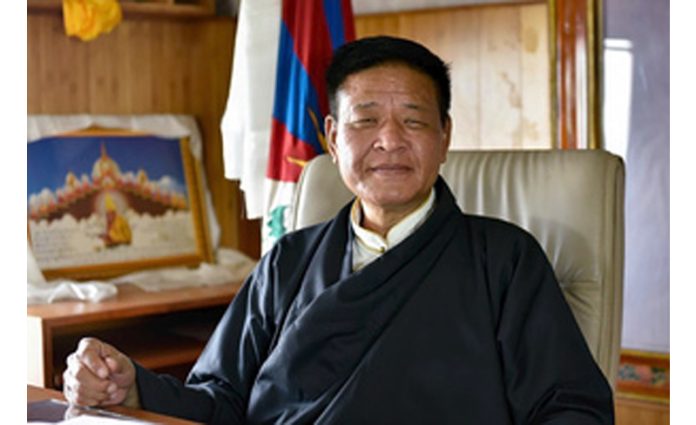NEW DELHI, Dec 6: Tibetan people are “dying a slow death” in the face of China’s repression and the democratic nations must stand up to the Chinese belligerence, president of Tibet’s government-in-exile Penpa Tsering has said.
Tsering said the “democratic free world” must look at the “internal forces” such as the Tibetans, Uyghur leaders and pro-democratic activists in Hong Kong to put pressure on Beijing to reverse its aggressive approach and bring “positive changes” within that country.
The Tibetan leader also underlined the importance for India to speak out clearly on issues like choosing the successor to the Dalai Lama and China’s overall muscle-flexing in the region.
He said there has not been much understanding in the world about the extent of China’s strategic objectives and plans and that there is a need to create awareness on what Beijing’s machinations are.
In an address at an awareness event on Panchen Lama, the Sikyong or political leader of the exiled Central Tibetan Administration accused China of destroying the historical basis of Tibet’s existence.
I have been telling the world that “we are dying a slow death, we are being stricken by being squeezed out of our breath by the dragon”, he said last night.
After a failed anti-Chinese uprising in 1959, the 14th Dalai Lama fled Tibet and came to India where he set up the government-in-exile. The Chinese government officials and the Dalai Lama or his representatives have not met in formal negotiations since 2010.
Beijing has in the past accused the Dalai Lama of indulging in “separatist” activities and trying to split Tibet and considers him as a divisive figure.
However, the Tibetan spiritual leader has insisted that he is not seeking independence but “genuine autonomy for all Tibetans living in the three traditional provinces of Tibet” under the “Middle-Way approach”.
Speaking to PTI, Tsering said that the Chinese government is facing various domestic challenges including in the economic and political fronts and there has to be a “union of internal and external forces” to bring “positive changes” within that country.
He identified Tibetans, Uyghur leaders and pro-democratic activists in Hong Kong as internal forces that have deep insights into China and its Communist government. Tsering said nobody wants anarchy in China.
“If you don’t want anarchy, then you need positive change in China, and the only way that can come about is through implosion. Nobody is going to attack them from outside,” he said.
The Tibet’s government-in-exile based in Himachal Pradesh’s Dharamshala represents over one lakh Tibetans living in around 30 countries.
In his remarks on the internal situation in China, Tsering claimed it is the only country that spends more financial resources on internal security than external security as the Communist regime has been facing anger from the people.
Listing challenges that Beijing has been facing, he named economic downturn, unemployment and housing problems, which constitute about 30 percent of China’s GDP, as the main vulnerabilities.
“We are the internal forces. There has to be a union of internal and external forces to bring about positive change. That is why I ask governments, please don’t look at us from the perspective of victims of communism that you can just pity on,” he said.
The Tibetan leader said even India can take inputs from Tibetans for its China strategy.
He also underlined the need for democracies including India, to speak more clearly on issues related to China.
“When we reach out, we can reach out only to the democratic free world. We cannot reach out to other authoritarian regimes, as they follow the same practise as what China does so. One thing that we have been saying is that democracies around the world should come together when it comes to China,” he said.
“It’s important to fight against authoritarian regimes and their ideology and their ambitions,” he added.
Referring to the eastern Ladakh border row, Tsering complimented New Delhi for taking a “very strong position” on disengagement from all quarters” for normalisation of ties.
“One has to be very, very strategic when you deal with China. I think the Indian government so far has taken a very strong position that unless there’s disengagement from all quarters, there won’t be normalisation of relations,” he said.
Asked about expectations from India on the issue of the successor to the 14th Dalai Lama, Tsering said a statement from New Delhi would be very helpful.
The Tibetan leadership has been maintaining that China cannot decide the next Dalai Lama.
He also referred to the US law on Tibet that said the issue about the reincarnation will be decided by the Dalai Lama.
Tsering said if the Indian Parliament or the government can come out with a statement, it will help the Tibetans because many people look at India’s leadership when it comes to Tibet.
The US and several democratic countries have been consistently supporting the Tibetan cause notwithstanding China’s strong objection.
In 2020, the US came out with legislation reaffirming the absolute right of Tibetan people to choose a successor to the Dalai Lama and the preservation of Tibet’s environment.
“It is really important that we create more awareness on what China is doing, not only to Tibet but also to the region, countries in the region and internationally,” Tsering said. (PTI)


